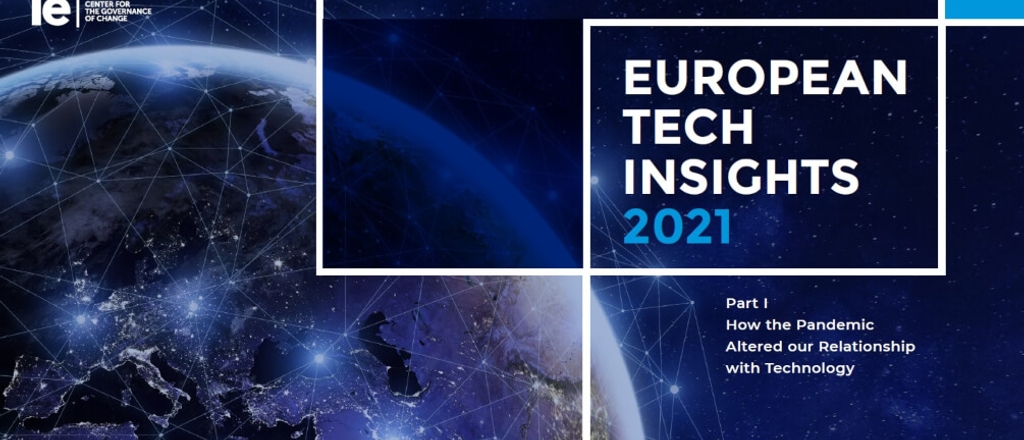- Home
- News And Events
- News
- Ie University Research Reveals Most Europeans Are Willing To Pay More Taxes To Raise The Salaries Of Key Workers
IE University research reveals most Europeans are willing to pay more taxes to raise the salaries of key workers

Today IE University’s Center for the Governance of Change (CGC) launches Part One of its annual Tech Insights report, which reveals the impact the pandemic has had on public attitudes in Europe, the US and China, towards healthcare, automation, social media and urban areas.
One year on from the outbreak of Covid-19, the findings suggest a sense of growing public responsibility to address the big societal issues which have been exposed or exacerbated by the pandemic - such as improving healthcare systems and protecting jobs.
In many cases, we are seeing a trend towards cooperation and social cohesion, and a changing relationship with urban spaces:
- Most Europeans (61%) are willing to pay more taxes to raise the salaries of essential workers from nurses to shop-workers. Highest support is found in Sweden (70%), UK (70%) and Spain (67%). The only country that is against the measure is France (54% against)
- Most Europeans (65%) support building a European Health Union to enhance cooperation in public health, with the strongest support in Spain (75%), Italy (73%) and the Netherlands (70%).
- 67% of Europeans support fiscal measures to help people and businesses move to smaller cities and rural areas, with the highest support in Spain (83%).
The report has also heightened job security concerns and points to a growing generational divide, which is set to widen as digital natives get older and their purchasing and political power grow.
- Most young Europeans under the age of 25 (46%) show less privacy concerns and are more willing to share personal data, like their health data, while most over 35s (53%) would prefer not to. Strongest support is seen in Italy (52%), Spain (41%) the Netherlands and Poland (38%).
- Similarly, young Europeans are willing to let their governments share their health records with companies like Google, with 55% of under 25-year olds in favour.
- Support for limiting automation to protect jobs is strongest among those under 44 (53% among 18-24- and 35-44-year olds) whereas those over 45 are more sceptical (only 45% of support on all groups over 45).
- The pandemic has also had an impact on Europeans’ relationship with the city. This year is the first time we record a majority (43% in favour vs 41% against) in favour of reducing the presence of cars in the center of cities through taxes or other restrictions. In 2020, only 38% supported the idea with 49% against.
Oscar Jonsson, Academic Director of the IE Center for the Governance of Change, commented:
“This year we have seen an overall acceleration and cohesion in sentiment, particularly with regards to healthcare, the support of essential workers and the value given to building greener urban spaces.”
“While there are clearly some disparities based on political, cultural or historical reasons – evidenced by Brexit for instance - it’s clear that the shared experience of Covid-19 and self-isolation has in many cases created a sense of solidarity and responsibility, which was not as evident before. We see this in shared fear of technological unemployment, as well as generational divides linked to tech and socio-economics across Europe.”
To compile this report, the CGC surveyed 2,769 respondents between 1-18 January 2021.
Part Two of the Tech Insights Report is expected in May and will focus primarily on the use of technology and the governance implications for democracy.
For more information and to review the full results of the European Tech Survey 2021, please click here.
About IE University
IE University offers a technology-based learning ecosystem for leaders making a difference in the world through innovation, global vision, an entrepreneurial mindset, and a Humanities-based approach. IE’s faculty includes more than 500 professors who teach degree and master's programs, doctorates, and executive training to students from 140 countries.
About Center for the Governance of Change (CGC)
The Center for the Governance of Change (CGC) is an applied-research, educational institution based at IE University that studies the political, economic, and societal implications of the current technological revolution and advances solutions to overcome its unwanted effects.
Survey Methodology
The European Tech Insights 2021 survey was conducted in January 2021 by Netquest. The 2,769 respondents were a representative for adults in the countries included, and by gender and age. Respondents are part of recurrent panels recruited by Netquest or affiliated companies into panels via social media, direct mailing or through referrals from other respondents. They receive small in-kind incentives for responding to each survey.